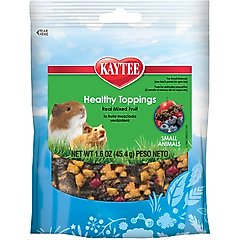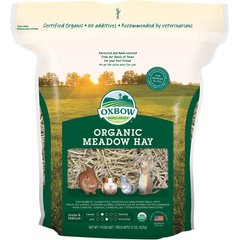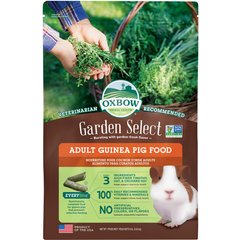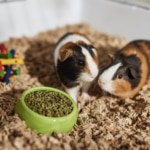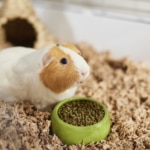Can Guinea Pigs Eat Blueberries?
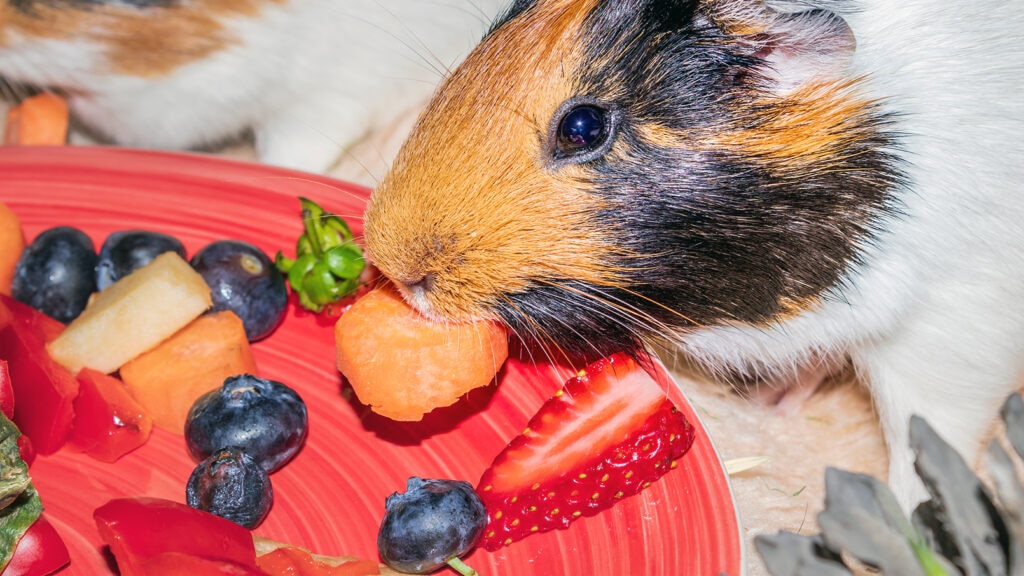
Photo by Ava-Leigh/iStock/Getty Images Plus
While snacking on a handful of blueberries, you look over to find your furry potato standing up on their two back feet with their little paws pressed up against their habitat, looking adorably hungry. Can guinea pigs eat blueberries too?
Yes, they can!
Blueberries can be a nutritious treat for guinea pigs when fed in small amounts. Because guinea pigs have sensitive digestive systems, new foods should be introduced gradually.
Before introducing any new food into your guinea pig’s diet, always check with your veterinarian.
Can Guinea Pigs Have Blueberries?
Yes, guinea pigs can eat blueberries—as long as they’re fresh and thoroughly washed, and fed in moderation.
Avoid canned, frozen, dried, or sugared varieties; these often contain added sugars or preservatives that can upset your guinea pig’s digestive system.
Recommended Products
Are Blueberries Good for Guinea Pigs?
Blueberries are often deemed a “superfood” for their many nutrients and health benefits packed into one itty-bitty, deep-blue berry.
Some benefits of blueberries for guinea pigs include:
They’re Rich in Antioxidants, Including Vitamin C
Guinea pigs need 10–20 mg of vitamin C daily, and blueberries can help them meet this requirement.
“Unlike most animals, guinea pigs can’t produce their own vitamin C,” says Michelle Jack, DVM, small animal and exotic mobile veterinarian and owner at Dr. Jack Vet Services, Inc., in Marina del Rey, California. “This essential nutrient must be provided through their diet to keep them healthy and prevent scurvy, a painful condition caused by vitamin C deficiency.”
For a convenient and balanced option, Dr. Jack recommends Oxbow Natural Science vitamin C supplements, which provide 25 mg of stabilized vitamin C without excess sugar or calcium.
Recommended Product
They Contain Other Essential Nutrients
Blueberries are a good source of vitamin K, manganese, and fiber—all of which contribute to overall health.
They’re Low in Calories
One cup of blueberries is just 80 calories, meaning the very few you give your guinea pig will be a healthy, low-calorie treat when offered on occasion.
Are Blueberries Bad for Guinea Pigs?
As with any other guinea pig–friendly human food, there are a few considerations to keep in mind before feeding blueberries to your hungry herbivore.
These include:
Stomach Problems Due to Naturally High Sugar Content
“Feeding blueberries and other fruits to guinea pigs should be done in extreme moderation,” says Walter Merker, DVM, exotic animal veterinarian at Orange Grove Animal Hospital in Tucson, Arizona, “because sudden variations in sugar content within the diet can upset the balance of the bacterial flora they rely on to obtain energy from their food from the process of hindgut fermentation.”
Weight Gain
Despite being a low-calorie food, eating too many treats outside of a guinea pig’s regular diet, such as blueberries, can lead to weight gain.
How Many Blueberries Can I Give My Guinea Pig?
As tempting as it may be to indulge your cavy in however many blueberries they’d like, it’s crucial to feed them an appropriate amount at an appropriate frequency.
Fruits are considered treats to guinea pigs and should be fed in moderation, making up no more than 5% of your cavy’s daily diet. The rest should come from a well-balanced diet of high-quality grass hay, fresh veggies, and pellets.
Recommended Products
“Any sort of foods containing higher amounts of sugar should be fed sparingly to guinea pigs,” says Dr. Merker.
“It would be safe to feed one blueberry to an adult guinea pig on a daily basis, and this can be cut into halves or quarters for use as a training treat or reward,” he adds.
| Guinea Pig Size | Serving Size | Frequency |
|---|---|---|
| Small (under 1.5 pounds) | 1 small blueberry | Daily |
| Average (1.5–2.5 pounds) | 1–2 small blueberries | Daily |
| Large (2.5+ pounds) | 1–3 small blueberries | Daily |
Slowly introduce blueberries to your guinea pig. If you suspect your piggie is unable to tolerate eating a blueberry daily, offer the fruit less frequently.
It’s always a good idea to consult your vet for serving size and frequency suggestions based on your individual guinea pig.
How To Safely Feed Blueberries to Guinea Pigs
These nutrient-dense fruits make for a great snack when fed accordingly.
Here’s how to prepare blueberries before serving them to your guinea pig:
- Thoroughly rinse. Rinsing fresh blueberries under cool water helps remove dirt and pesticides.
- Cut into bite-size pieces. This is optional, but cutting blueberries into halves or quarters can make it easier for them to eat (and for you to check their tolerance).
My Guinea Pig Ate Too Many Blueberries—What Do I Do?
If fed too frequently or in excess, blueberries can lead to the following side effects in guinea pigs:
- Diarrhea
- Bloating
- Weight gain
If you notice soft stool or decreased appetite, Dr. Jack says to stop feeding blueberries, offer hay and water, and contact your vet.
What Other Fruits Can Guinea Pigs Eat?
Want to feed your precious piggie some other zoomie-inducing fruits?
A few fruits that are safe for guinea pigs to eat include:
- Apples (no core or seeds)
- Bananas
- Cantaloupe
- Grapes
- Kiwis
- Oranges
- Pears (no seeds)
- Peaches
- Strawberries
- Watermelon (no seeds or rind)
Certain fruits, such as apples, pears, grapes, oranges, and other citrus fruits, contain more sugar than blueberries and are more likely to contribute to diarrhea and gastrointestinal issues, Dr. Merker says. Serve these only in small amounts.
A lack of dietary vitamin C is often a concern for pet parents because guinea pigs are unable to synthesize it, Dr. Merker says. For sources of this important nutrient, he recommends vitamin C-packed foods, such as:
- Flat parsley
- Dandelion greens
- Red bell pepper (in small amounts)
FAQs About Blueberries for Guinea Pigs
Q: Can baby guinea pigs eat blueberries?
A: No, feeding baby guinea pigs blueberries isn’t recommended. Although baby guinea pigs can technically eat blueberries, Dr. Jack says to avoid offering fruits to young guinea pigs because they may cause diarrhea and a drop in temperature very quickly.
Q: Can guinea pigs eat blueberry leaves or stems?
A: Maybe. Blueberry leaves and stems aren’t toxic to guinea pigs but may not be ideal for their sensitive stomachs.
“While [blueberry leaves and stems] may be a source of fiber, it seems it may be best to avoid blueberry stems and leaves due to them being difficult to digest,” Dr. Merker says, “and having tannins present within them may contribute to diarrhea.”
Q: Can guinea pigs have frozen blueberries?
A: It depends. Guinea pigs can’t eat frozen blueberries unless they’re thawed and unsweetened. Otherwise, giving blueberries straight out of the freezer, or frozen blueberries containing sugars or preservatives, isn’t recommended.
Q: Can guinea pigs eat dried blueberries?
A: No, guinea pigs shouldn’t eat dried blueberries. Dried, canned, and sugared varieties of blueberries should be avoided, since they often contain added sugars or preservatives that can upset your guinea pig’s digestive system, Dr. Jack says.
Q: What fruits are toxic to guinea pigs?
A: Fruits including avocado (which contains persin), rhubarb (highly toxic), and any fruit seeds or pits, like apple seeds or cherry pits (contain cyanide compounds), are toxic to guinea pigs and should always be avoided, Dr. Jack says.
Attributions
This content was medically reviewed by Teresa Manucy, DVM, Chewy veterinarian.

